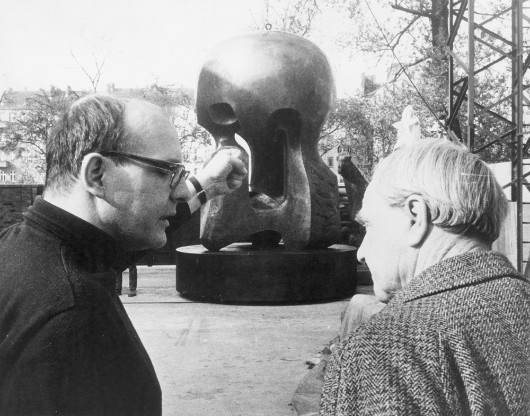 Editor's Introduction
Editor's Introduction
Next year marks the 20th anniversary of the founding of the Martin Marty Center at the University of Chicago Divinity School. Over the past two decades Sightings—with its sister publication, the Religion & Culture Forum—has featured contributions from hundreds of authors commenting on a wide range of topics and trends at the intersection of religion and public life. In the lead-up to that milestone, Sightings will be looking back through our archives to bring you some of what Matthew Arnold would call “the best which has been thought and said” in these digital “pages.”
Today's inaugural issue of “Sightings Classic”—prompted by last weekend’s March for Science in Washington, D.C., and around the world—contains highlights from a long list of columns that have explored the complex relationships between science and religion. Arthur E. Farnsley II reports on an April 2004 workshop held by the Academy of Neuroscience for Architecture on “Experiencing Sacred Spaces.” William Schweiker and Eric Weislogel engage in a spirited dialogue regarding the late-life conversion of British philosopher Antony Flew to a certain form of theistic belief, and its significance (or lack thereof) for those involved in religion-and-science/science-and-religion studies. Peter Han reflects on the February 2014 debate between Bill Nye and Ken Ham on the question “Is Creation a Viable Model of Origins?” Finally, we include the April 2016 edition of the Religion & Culture Forum, in which Nancy Frankenberry discusses “Believing Scientists in America.”
We hope you enjoy this issue and look forward to future issues of “Sightings Classic”!
Image: Nuclear Energy by Henry Moore dedicated December 2, 1967 | University of Chicago Photographic Archive, [apf2-05345], Special Collections Research Center, University of Chicago Library
|
Neuroscience and Religious Architecture
By Arthur E. Farnsley II | August 5, 2004
“Can sacred experiences truly be measured? Even if they could, what happens if subsequent generations wish their worship space to evoke different reactions? Will a single design elicit the same response from young and old, men and women, rich and poor, eastern and western? Might there be some insidious element in using neurological experiments to shape human experience? Is this a little too high-tech and Brave New World for most churchgoers? Finally, is this emerging field just a playground for intellectuals with nothing better to do?” (READ MORE)
|
|
Faith and Flew
By William Schweiker | December 16, 2004
“Explanations of DNA are to be sought and treasured; they provide limits on plausible claims about God’s interactions in the world and aid in grasping the meaning of the integrity of life. Yet removed from the labor of justice and love, these scientific conclusions are hardly the stuff that brings forth lives worth living. It is better to endorse theoretic openness, even skepticism, bound to a practical, living faith. Yet in making that point, believers ought not to cling to false consolation. There is religious, practical work to be done.” (READ MORE)
|
|
Science and Religion in Dialogue
By Eric Weislogel with a response from William Schweiker | January 6, 2005
“Science and religion are two main paths we human beings have taken in our efforts to know and understand ourselves, our communities, and our cosmos. The religion-and-science movement is not (or ought not to be) attempting to develop some new academic discipline; rather, the community of scholars and religious practitioners engaged in it are helping us all to re-learn the art of ‘seeing the forest for the trees,’ helping us to transcend (while respecting) the various academic disciplines to reach toward unity of knowledge...” (READ MORE)
|
|
Science vs the Bible: Reasons Why This Debate Will Never Be Settled
By Peter Han | April 3, 2014
“There was no real winner in the Nye-Ham debate because the debate focused on the wrong topic. The debate is not between scientific fact and religious faith. The real question is whether it is wrong for reasonable people in the age of science to believe a myth, which grounds their lives in meaning. On this, the science of Nye and the skepticism of Hume may say, ‘It is wrong,’ but the scientist and skeptic are incapable of providing meaningful reasons as to why one should prefer a meaningless world.” (READ MORE)
|
|
Believing Scientists in America: Polling from Leuba to Larson to Pew
By Nancy Frankenberry for the Religion & Culture Forum | April 2016
“We believe the scientific theory of evolution because overwhelming data supports it, and we will do so until data say otherwise. Contrary to what many contributors to the science and religion discussion now argue, science is not another form of faith, alongside religion. Indeed, both have been wrong in their conclusions, and both have a history of inhumane, vile, and meretricious moral consequences, but functionally there is no analogy that makes religion and science look convincingly similar...” (READ MORE)
|
Sightings is edited by Brett Colasacco, PhD candidate in Religion, Literature, and Visual Culture at the University of Chicago Divinity School. Subscribe here to receive Sightings in your inbox twice a week.
 Editor's Introduction
Editor's Introduction
